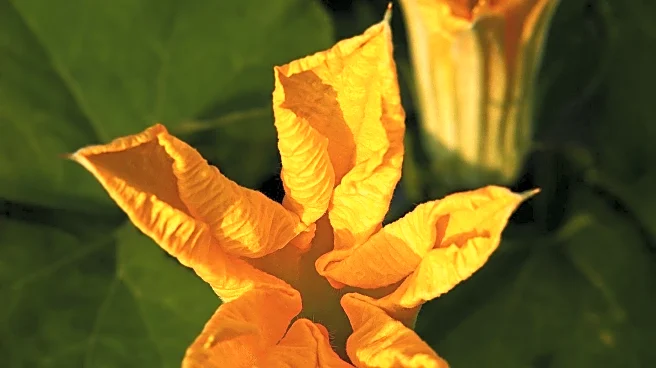What's Happening?
A 64-year-old woman in Canada was diagnosed with a rare condition known as toxic squash syndrome after consuming homemade juice made from bitter calabash, also known as bottle gourd. The woman experienced
severe symptoms including weakness, nausea, vomiting, diarrhea, and abdominal pain shortly after drinking the juice. Medical tests revealed she was suffering from shock, a life-threatening condition caused by toxins in the squash juice. The toxins, identified as cucurbitacins, are bitter-tasting chemicals found in the Cucurbitaceae family, which includes cucumbers, pumpkins, and zucchinis. These chemicals can accumulate in squashes and gourds as they ripen, posing a risk to consumers. The woman was treated in the intensive care unit, where her condition stabilized after five days. She later reported hair loss, a symptom associated with the syndrome.
Why It's Important?
This case highlights the potential dangers of consuming homemade juices from certain gourds, which can accumulate toxic compounds. The incident underscores the importance of food safety and awareness regarding the consumption of domesticated plant varieties that may contain harmful chemicals. The rarity of toxic squash syndrome means that many people may be unaware of the risks associated with consuming bitter-tasting gourds. This case serves as a reminder for consumers to be cautious and informed about the foods they consume, especially when dealing with homemade preparations. The medical community may need to consider this syndrome in differential diagnoses when patients present with similar symptoms.
What's Next?
The case may prompt further research into the toxicological effects of cucurbitacins and their impact on human health. Medical professionals might increase awareness and education regarding the risks of consuming bitter gourds, especially in regions where these plants are commonly used in traditional medicine. There could be calls for regulatory measures to ensure consumer safety, such as labeling requirements for gourds that may contain high levels of cucurbitacins. Additionally, the case may lead to more studies on the long-term effects of toxic squash syndrome, including symptoms like hair loss.
Beyond the Headlines
The cultural practice of using calabash juice in traditional medicine, particularly in countries like India, may come under scrutiny. This case could lead to discussions about balancing traditional practices with modern food safety standards. Ethical considerations may arise regarding the responsibility of informing the public about potential food hazards associated with traditional dietary practices.










